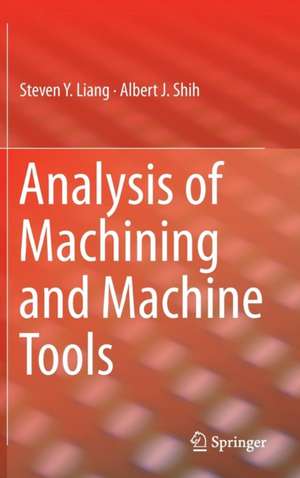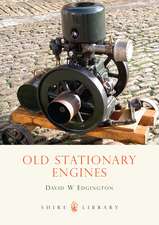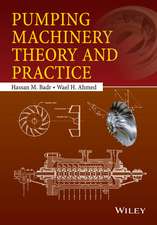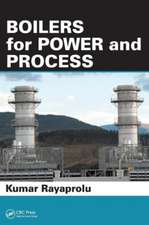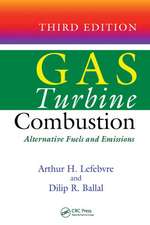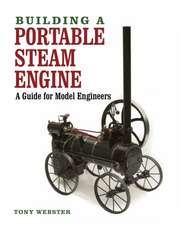Analysis of Machining and Machine Tools
Autor Steven Liang, Albert J. Shihen Limba Engleză Hardback – 30 dec 2015
| Toate formatele și edițiile | Preț | Express |
|---|---|---|
| Paperback (1) | 489.30 lei 6-8 săpt. | |
| Springer Us – 30 mar 2019 | 489.30 lei 6-8 săpt. | |
| Hardback (1) | 752.41 lei 6-8 săpt. | |
| Springer Us – 30 dec 2015 | 752.41 lei 6-8 săpt. |
Preț: 752.41 lei
Preț vechi: 885.19 lei
-15% Nou
Puncte Express: 1129
Preț estimativ în valută:
143.98€ • 153.96$ • 120.04£
143.98€ • 153.96$ • 120.04£
Carte tipărită la comandă
Livrare economică 18 aprilie-02 mai
Preluare comenzi: 021 569.72.76
Specificații
ISBN-13: 9781489976437
ISBN-10: 1489976434
Pagini: 230
Ilustrații: XIV, 230 p. 158 illus., 41 illus. in color.
Dimensiuni: 155 x 235 x 19 mm
Greutate: 5.09 kg
Ediția:1st ed. 2016
Editura: Springer Us
Colecția Springer
Locul publicării:New York, NY, United States
ISBN-10: 1489976434
Pagini: 230
Ilustrații: XIV, 230 p. 158 illus., 41 illus. in color.
Dimensiuni: 155 x 235 x 19 mm
Greutate: 5.09 kg
Ediția:1st ed. 2016
Editura: Springer Us
Colecția Springer
Locul publicării:New York, NY, United States
Public țintă
GraduateCuprins
Introduction.- Single Point Cutting Processes.- Multiple Point Cutting Processes.- Grinding Processes.- Machine Tool Components.- Machine Tool Accuracy and Metrology.- Mechanics of Machining.- Shear Stress in Cutting.- Cutting Temperature and Thermal Analysis.- Machine Tool Chatter.- Electrical Discharge Machining.- Electrochemical Machining, Chemical Machining and Chemical Mechanical Polishing Processes.- Laser and Electron Beam Machining.- Biomedical Machining.
Notă biografică
Steven Y. Liang is Morris M. Bryan, Jr. Professor in Mechanical Engineering for Advanced Manufacturing Systems at Georgia Institute of Technology, USA.
Albert J. Shih is Professor in Mechanical Engineering, Biomedical Engineering, and Integrative Systems + Design (ISD) at the University of Michigan, USA. He is the Associate Chair of ISD and Director of the Global Automotive and Manufacturing Engineering Program.
Albert J. Shih is Professor in Mechanical Engineering, Biomedical Engineering, and Integrative Systems + Design (ISD) at the University of Michigan, USA. He is the Associate Chair of ISD and Director of the Global Automotive and Manufacturing Engineering Program.
Textul de pe ultima copertă
This book delivers the fundamental science and mechanics of machining and machine tools by presenting systematic and quantitative knowledge in the form of process mechanics and physics. It gives readers a solid command of machining science and engineering, and familiarizes them with the geometry and functionality requirements of creating parts and components in today’s markets. The authors address traditional machining topics, such as:
cal engineering students, manufacturing engineers, and researchers. Each chapter contains examples, exercises and their solutions, and homework problems that reflect practical industrial applications. The authors provide a platform for mastering the basic theories and fundamental principles of machining so that readers will be able to effectively handle new materials, tools, machines, and configurations long after they put the book down.
- single and multiple point cutting processes
- grinding
- components
- accuracy and metrology
- shear stress in cutting
- cutting temperature and analysis
- chatter
- electrical discharge machining
- electrochemical machining
- laser and electron beam machining
Caracteristici
Includes coverage of traditional and non-traditional machining based on energy beams, abrasives and fluids Includes advanced level material with an emphasis on analytical and quantitative reasoning Contains detailed examples and homework problems Provides case studies from the automotive and aerospace industry that help illustrate key points and allow readers to see the concepts discussed in a real world setting
